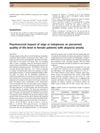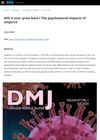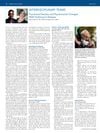54 citations,
April 2011 in “Journal of Multidisciplinary Healthcare” SLE patients often face depression and anxiety due to physical changes, with African-American and Hispanic patients having higher unmet psychological needs.
 29 citations,
November 2018 in “Journal of The European Academy of Dermatology and Venereology”
29 citations,
November 2018 in “Journal of The European Academy of Dermatology and Venereology” Personality traits and anxiety affect hair loss patients' quality of life.
 16 citations,
January 2011 in “Indian Journal of Dermatology”
16 citations,
January 2011 in “Indian Journal of Dermatology” Most patients with cicatricial alopecias face significant psychological and social challenges due to their hair loss.
 9 citations,
December 2012 in “The Journal of Dermatology”
9 citations,
December 2012 in “The Journal of Dermatology” Wearing wigs or hairpieces improves self-esteem, adaptability, and competence in women with alopecia areata.
 8 citations,
October 2018 in “Journal of Investigative Dermatology”
8 citations,
October 2018 in “Journal of Investigative Dermatology” Many patients with Alopecia Areata in Korea experience anxiety, depression, and reduced quality of life, which are often unrelated to the severity of hair loss.
 6 citations,
May 2017 in “InTech eBooks”
6 citations,
May 2017 in “InTech eBooks” Hair loss can cause serious mental health problems and treating it requires a team of experts.
 5 citations,
April 2016 in “PubMed”
5 citations,
April 2016 in “PubMed” Young men with mild hair loss who experience significant social and emotional distress are more likely to have sexual problems.
 4 citations,
July 2021 in “International Journal of Environmental Research and Public Health”
4 citations,
July 2021 in “International Journal of Environmental Research and Public Health” Women who lost hair from childhood head radiation are more likely to face mental health issues than men.
 1 citations,
October 2022 in “Cureus”
1 citations,
October 2022 in “Cureus” Patients with chronic skin disorders often experience depression, anxiety, and reduced quality of life and may benefit from psychiatric help.
1 citations,
January 2022 in “Dermatology Research and Practice” Androgenetic alopecia negatively affects self-esteem and daily stress, especially in young men.
 1 citations,
August 2004 in “Alternative & complementary therapies”
1 citations,
August 2004 in “Alternative & complementary therapies” Non-drug methods like diet, supplements, and aromatherapy can help manage hair loss and its emotional impact.
 June 2024 in “Skin Health and Disease”
June 2024 in “Skin Health and Disease” Men with alopecia often feel less confident and have lower wellbeing, needing more support.
April 2024 in “Cosmetics” Wigs help improve self-esteem and quality of life for people with hair loss from alopecia areata.
 December 2023 in “Journal of family medicine and primary care”
December 2023 in “Journal of family medicine and primary care” Hair loss in Saudi Arabia causes a low psychosocial impact, with less effect on those without a family history of hair loss.
 August 2023 in “Psychology, Health & Medicine”
August 2023 in “Psychology, Health & Medicine” Hair loss (androgenetic alopecia) mildly to moderately affects men's quality of life but not significantly their mental health.
 May 2023 in “Dermatology online journal”
May 2023 in “Dermatology online journal” Kids with vitiligo, psoriasis, or alopecia areata are more likely to experience anxiety, depression, and social challenges.
January 2021 in “Brazilian Journal of Development” Female hair loss causes emotional distress and needs holistic treatment.

Hair loss can cause significant social and emotional issues, especially for women and young men.
 180 citations,
September 1999 in “British Journal of Dermatology”
180 citations,
September 1999 in “British Journal of Dermatology” Hair loss affects self-esteem and quality of life; treatments can help.
 46 citations,
August 2019 in “Journal of the European Academy of Dermatology and Venereology”
46 citations,
August 2019 in “Journal of the European Academy of Dermatology and Venereology” People with hair loss conditions experience more anxiety, depression, and a lower quality of life than those without these conditions.
January 2021 in “Menoufia Medical Journal (Print)” Androgenetic alopecia negatively affects emotions and self-confidence, especially in younger people.
 36 citations,
November 2018 in “American Journal of Clinical Dermatology”
36 citations,
November 2018 in “American Journal of Clinical Dermatology” Alopecia is linked to various health and mental conditions, impacts life quality, and needs medical attention beyond its cosmetic effects.
 28 citations,
January 2015 in “Journal der Deutschen Dermatologischen Gesellschaft”
28 citations,
January 2015 in “Journal der Deutschen Dermatologischen Gesellschaft” Women with scarring alopecia have a lower quality of life and more anxiety and depression than those with non-scarring alopecia.
 3 citations,
March 2010 in “Acta Médica Portuguesa”
3 citations,
March 2010 in “Acta Médica Portuguesa” Polycystic ovary syndrome (PCOS) significantly impacts women's emotional well-being and social lives, requiring treatments that include psychological support.
 January 2024 in “JEADV clinical practice”
January 2024 in “JEADV clinical practice” Gender-affirming dermatology treatments generally improve mental well-being for transgender individuals, but more research is needed.

Health care providers should address the emotional challenges of SLE patients with comprehensive care.
 January 2021 in “Dalhousie Medical Journal”
January 2021 in “Dalhousie Medical Journal” Alopecia, a hair loss issue, needs both medical and psychological treatments due to the limited effectiveness of drugs alone.

The interdisciplinary approach improved the quality of life for a Parkinson's patient and eased staff workload.
December 2021 in “BMJ Open” Androgenetic alopecia in men aged 46 is not significantly linked to depression, anxiety, quality of life, self-esteem, or sexual symptoms.






















